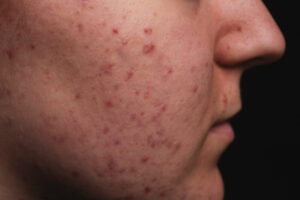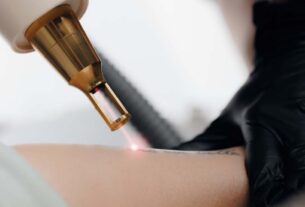What is Stress and How Does it Affect Your Skin?
Stress is the body’s natural response to challenging situations. When you’re stressed, your body releases a hormone called cortisol. This hormone is part of the “fight or flight” response, preparing your body to face a threat. However, when stress becomes chronic, cortisol levels remain elevated, which can lead to a range of health issues – one of which is acne.
Cortisol plays a key role in the skin’s oil production. When cortisol levels are high, your sebaceous glands (the glands that produce oil) become overactive. This increase in oil can clog pores, leading to acne breakouts. So, while stress itself doesn’t directly cause acne, the hormonal changes it triggers can make your skin more prone to it.

The Connection Between Stress and Acne
When stress is prolonged, it causes a cascade of reactions within your body that can contribute to acne. Here’s a breakdown of how it works:
- Increased Oil Production: As mentioned earlier, high cortisol levels can cause the sebaceous glands to overproduce oil. Excess oil can mix with dead skin cells, clogging your pores and creating an ideal environment for bacteria to thrive. This bacteria leads to inflammation, which can cause pimples, blackheads, and cystic acne.
- Inflammation: Stress can also lead to inflammation in the body. When your skin is inflamed, it can become red, swollen, and more likely to break out. Inflammatory skin conditions like acne may worsen when stress is not managed.
- Weakening the Skin’s Barrier: Stress weakens the skin’s protective barrier, making it more susceptible to external irritants, pollutants, and harmful bacteria. This weakened barrier can also increase the risk of infection, making existing acne worse or leading to new breakouts.
- Changes in Lifestyle: When we’re stressed, we often neglect self-care routines such as eating healthy, sleeping well, or even cleansing our face properly. These habits can contribute to the development of acne. For instance, poor sleep can trigger an increase in cortisol levels, and a lack of proper hydration can dry out the skin, leading it to produce more oil.
- Picking and Touching the Skin: People under stress may tend to touch their face more often, unconsciously transferring dirt, bacteria, and oil to the skin. This can worsen existing acne or create new blemishes.
Stress Management for Clearer Skin
While stress can play a significant role in acne breakouts, it is possible to manage stress and take control of your skin. Here are some practical tips to reduce the impact of stress on your acne:
- Practice Mindfulness and Relaxation: Techniques like meditation, deep breathing exercises, and yoga can help calm your mind and lower cortisol levels. Taking time to relax each day can have a positive impact on both your mental health and your skin.
- Regular Exercise: Exercise is a great way to relieve stress and reduce cortisol levels. It also improves blood circulation, which helps deliver oxygen and nutrients to your skin. Just make sure to wash your face after exercising to remove sweat and prevent clogged pores.
- Healthy Diet: A balanced diet rich in fruits, vegetables, whole grains, and lean proteins can help support your skin’s health. Foods high in antioxidants, such as berries, green leafy vegetables, and nuts, can reduce inflammation and protect the skin.
- Get Enough Sleep: Quality sleep is essential for reducing stress and promoting overall well-being. Lack of sleep can worsen skin conditions and make you more prone to acne. Aim for 7-9 hours of restful sleep each night to allow your skin to repair itself.
- Proper Skin Care Routine: Develop a skincare routine that focuses on cleansing, moisturizing, and treating acne. Use gentle, non-comedogenic products to avoid irritating your skin. Don’t forget to remove makeup before bed to prevent pore-clogging.
- Avoid Picking at Your Skin: While it can be tempting to pop pimples or touch your face, try to resist the urge. Picking at acne can lead to scarring and make the situation worse.
Conclusion
Stress is undoubtedly a factor that can contribute to acne breakouts, but with the right strategies, you can reduce its impact on your skin. By managing stress through relaxation techniques, exercise, and proper self-care, you can help keep your skin clear and healthy. If you’re struggling with stress-related acne and need professional guidance, don’t hesitate to reach out to Reflection Facthetics Clinic in Bangalore, where Dr. Deepika and her team can assist you in finding the right treatment for your skin. Book Now and take the first step towards healthier, clearer skin.



